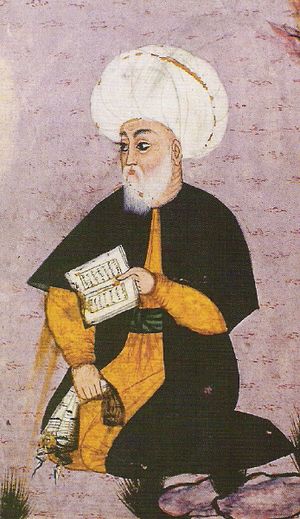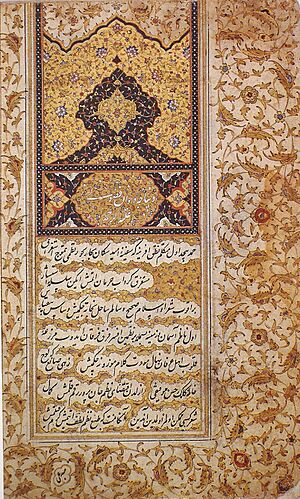Fuzûlî facts for kids
Fuzûlî (فضولی) was the pen name of a very important poet named Muhammad bin Suleyman. He lived from about 1483 to 1556. He is known as one of the greatest poets in the Dîvân tradition of Turkish literature.
Fuzûlî wrote his poems, which are collected in books called dîvân, in three different languages. These were Azerbaijani Turkish, Persian, and Arabic. Even though his Turkish poems were in Azerbaijani, he also knew about the Ottoman and Chagatai Turkish writing styles. He was also very good at math and astronomy.
Contents
Life of Fuzûlî
Fuzûlî was born around 1483 in a place that is now part of Iraq. He was probably born in either Karbalā’ or an-Najaf. Fuzûlî's family had been nomads, which means they moved around a lot. But by his time, his family had settled down in towns.
Fuzûlî was taught by his father, who was a religious scholar (a mufti) in the city of Al Hillah. Later, he had another teacher named Rahmetullah. During this time, he learned Persian and Arabic languages. These were in addition to Azerbaijani, which was his first language.
How Fuzûlî Chose His Pen Name
One interesting thing we know about Fuzûlî's life is how he got his pen name. A pen name is a special name a writer uses instead of their real name. In one of his books, he explained that when he first started writing poems, he would pick a pen name. But then he would find out someone else was already using it!
So, he decided to use the Arabic word fuzûlî. This word literally means "impertinent," "improper," or "unnecessary." He chose it because he thought "no one else would want this name."
However, the name had a secret, clever meaning. This is called tevriyye in Ottoman Divan poetry. Fuzûlî explained that the word fuzûl also means "learning" in the dictionary. It sounds like words for "sciences" and "arts." So, his pen name cleverly showed that he was full of knowledge and skills.
Life Under Ottoman Rule
In 1534, the Ottoman sultan, Süleymân I, took over the area of Baghdad where Fuzûlî lived. Before this, the Safavid Empire ruled there. Fuzûlî hoped to become a poet for the Ottoman court. This meant he would get support and money from the sultan. He wrote many poems praising the sultan.
Because of this, he was promised a regular payment. But he never actually received it. This made him upset, and he wrote about it in one of his most famous works. It was a letter called Şikâyetnâme, which means "Complaint."
He wrote:
- سلام وردم رشوت دگلدر ديو آلمادىلر
- Selâm verdim rüşvet değildir deyü almadılar.
- I said hello, but they didn't accept it since it wasn't a bribe.
Because he didn't get his payment, Fuzûlî never became financially secure. He died in 1556 during an outbreak of a serious illness, possibly the plague or cholera. He passed away in Karbalā’.
Works by Fuzûlî
Fuzûlî wrote many important works in different languages.
Works in Azerbaijani Turkish
- Dîvân ("Collected Poems")
- Hadîkat üs-Süedâ ("Garden of Pleasures")
- Dâstân-ı Leylî vü Mecnûn ("The Epic of Layla and Majnun")
- Risâle-i Muammeyât ("Treatise on Riddles")
- Şikâyetnâme ("Complaint")
Works in Persian
- Dîvân ("Collected Poems")
- Anîs ol-qalb ("Friend of the Heart")
- Haft Jâm ("Seven Goblets")
- Rend va Zâhed ("Hedonist and Ascetic")
- Resâle-e Muammeyât ("Treatise on Riddles")
- Sehhat o Ma'ruz ("Health and Sickness")
Works in Arabic
- Dîvân ("Collected Poems")
- Matla' ul-İ'tiqâd ("The Birth of Faith")
Images for kids
See also
 In Spanish: Fuzûlî para niños
In Spanish: Fuzûlî para niños
 | Chris Smalls |
 | Fred Hampton |
 | Ralph Abernathy |







